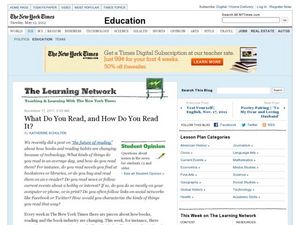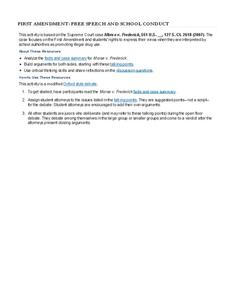Curated OER
It's Your Opinion
Students view "Inkheart: Speak Your Mind" by Cornelia Funke. They read several letters to the editor of a local newspaper and underline the 'opinion' portions of the letters. They discover how a literary selection can expand personal...
Curated OER
Structure and Support
Eighth graders read copies of The Declaration of Independence, United States constitution, and the Bill of Rights. They write an opinion about the document they feel is most important in the history of the united states. This is their...
Curated OER
How To Write Good Letter to the Editor
Students discover how to write a letter to the editor that would be good enough to be considered for publication. They include her or his opinion about the story, share a story of a similar experience to the author's or offer advice to...
Curated OER
Editorial Writing: What's On Your Mind
Students write an editorial column for a newspaper. For this journalism lesson, students discuss and analyze editorials in print and broadcast media. Students will compare the differences in these two formats of editorial pieces and then...
Curated OER
What Makes a Hero?
In this heroes instructional activity, students read the statements about heroes and circle either agree or disagree about the statement. Students do this for 12 statements and write their opinion about heroes.
Curated OER
"I Don't Pay Attention to Advertisements? (At least I don't think so?)"
Sixth graders study eight persuasive techniques that occur in a variety of media types. They write a persuasive essay and present it to the class. They create a "new product" for which they produce an advertisement using persuasive...
Curated OER
Journal Writing
Students investigate the life of Martha Wayles Jefferson. In this American history lesson plan, students examine excerpts of the journals kept by Thomas Jefferson's wife. Students infer what life at Monticello may have been like....
Curated OER
Harry Potter: Study Questions
Elementary learners explore fiction storytelling through partcipating in a survey. They identify the characters, themes and plot of the Harry Potter series while discussing their opinions in class. Learners conduct a survey about their...
Curated OER
Reading Blog Log
Bring technology to your novel unit with this lesson, which prompts readers to analyze a book they are reading in a Socratic discussion with their classmates. They create a live blog online in which they can give their opinions and...
National Constitution Center
Creating Your Own Town Hall Poster
Middle and high schoolers are walking into a world rife with strong political viewpoints and vocal opinions. Help to prepare them for controversial discussions with a lesson in which they choose, research, and learn more about a...
Smithsonian Institution
Mary Henry: Journal/Diary Writing
A great way to connect social studies with language arts, a resource on Mary Henry's historical diary reinforces the concepts of primary and secondary sources. It comes with an easy-to-understand lesson plan, as well as the reference...
Ohio Literacy Resource Center
Arguing with Aristotle Ethos, Pathos, Logos
Introduce your classes to the Art of Rhetoric with a lesson that focuses on Aristotle's persuasive appeals and how they have been used, both ethically and unethically, to influence opinion.
Curated OER
Create a Public Opinion Survey: The Middle East in the News
Though the discrete content here is a pair of New York Times articles about a 1998 military strike on Iraq and the coincident impeachment by the House of Representatives of then-President Clinton, this detailed plan for creating,...
Curated OER
Student Opinion: What Do You Read, and How Do You Read It?
Stimulate discussion with this brief article and series of questions related to reading habits. This resource, from the New York Times' The Learning Network, asks learners to comment on their own reading habits. You could have your class...
Student Handouts
Five Amazing Facts About...
What are five amazing facts about you? Your best friend? Butterflies? The United States? The possibilities are endless with this worksheet!
EngageNY
Author’s Read: Final Performance Task
Scholars submit their final performance task, a letter to a publisher about an athlete's legacy. As a culminating activity, they share their work with classmates in small groups.
Administrative Office of the US Courts
Morse v. Frederick
If you stop a student from expressing views that advocate drug use, are you violating their right to free speech? Use the 2007 Supreme Court case Morse v. Frederick to discuss a nuanced interpretation of the First Amendment. Learners...
Orlando Shakes
Twelfth Night: Study Guide
From lonely to luggage, it would be nearly impossible to have a modern-day conversation without using words that William Shakespeare coined. A Twelfth Night study guide introduces individuals to fun Shakespeare facts as they participate...
Curated OER
Corporal Punishment
Nineteen states legally permit school officials to physically punish children. Scholars learn more about the topic as they use the website to prepare for a class debate or discussion. Pupils read background information and discover the...
ProCon
Daylight Savings Time
An entomologist named Geroge Vernon Hudson is credited with proposing Daylight Saving Time (DST) so he could better study his insects. Using the informative website, scholars read a brief introduction to the topic and then explore the...
Professional Development Institute
Which Is More Important?
Think about the roles of hunters and squaws in Elizabeth George Speare's The Sign of the Beaver. Whose work is more important? Young writers compare Attean and Matt's reaction to each gender's role, as well as arguing their opinion...
EngageNY
Grade 9 ELA Module 2, Unit 2, Lesson 9
How can a prophecy be true if the future differs from what was foreseen? Sophocles entertains this question in Oedipus the King. Teiresias, Creon, and Oedipus have weighed in on the unsolved murder of Laius, and now Jocasta voices her...
C-SPAN
Electoral College Pros/Cons and Alternatives
If every vote counts, why do we need the electoral college? Middle and high schoolers study the Constitutional precedent of the electoral college, as well as its place in historical and modern elections, with an engaging social studies...
ProCon
Drinking Age
Eighteen is the age of adulthood in the United States, but 21 is the legal drinking age. Pupils use the provided website to determine whether the age to legally purchase and consume alcohol should be lowered. They weigh the pros and...

























